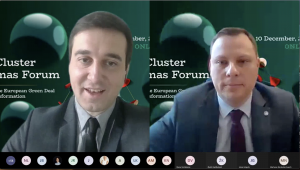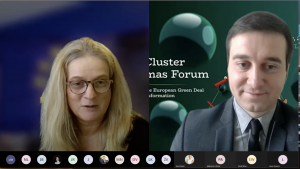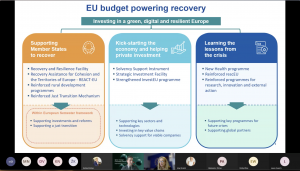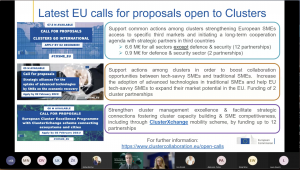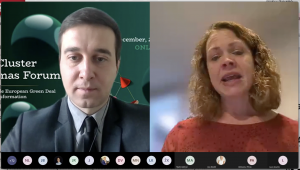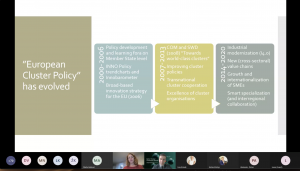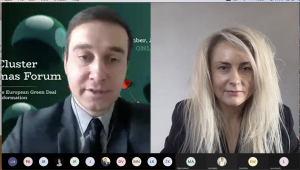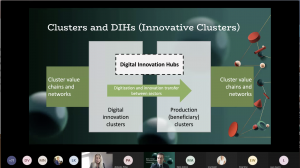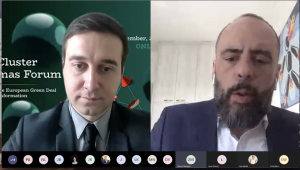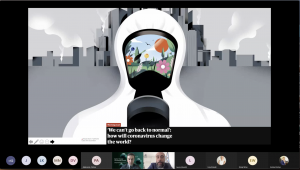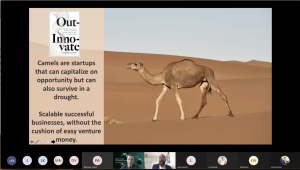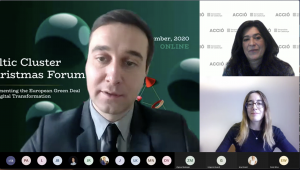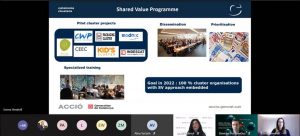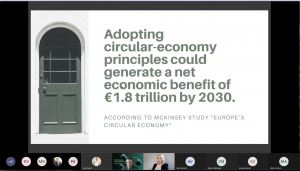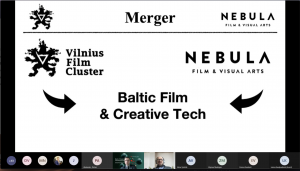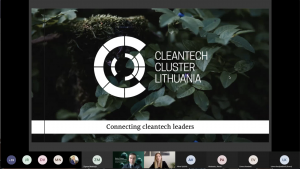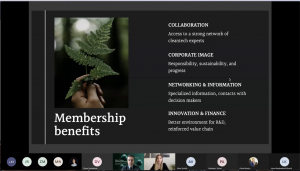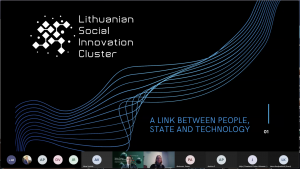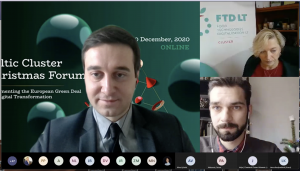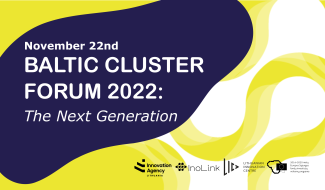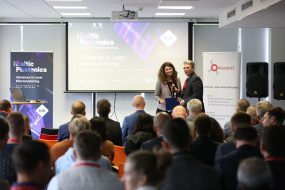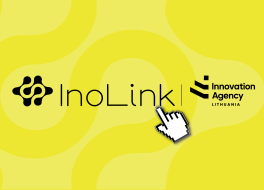Cluster community wrapped-up 2020: do we want to get back to where we were
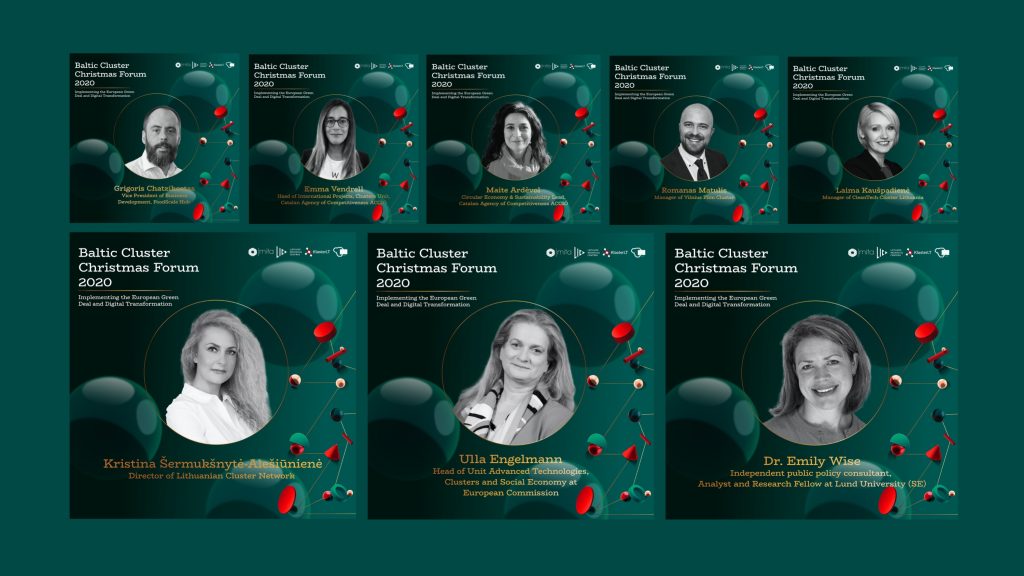
The cluster community ended the 2020s with an international forum. The event attracted over 100 participants from all over Europe. “Christmas Baltic Cluster Forum is a traditional event of the cluster community, but it is very different and especially important this year. The COVID-19 crisis obliges us all to discuss and share insights more actively and responsibly than ever,” said Gintas Kimtys, Head of the Agency for Science, Innovation and Technology (MITA), which organizes the event annually.
Clusters have proven to be resilient partners
The forum was opened by Ulla Engelmann, Head of Advanced technologies, Clusters and Social Economy Unit at European Commission, who gave a speech on the role of clusters in the recovery.
She recalled the day-to-day monitoring of the situation at the European level and the ongoing assessment of the most affected markets.
Clusters have already proven to be strong and resilient partners this year. “It is a key tool for innovation projects, an ideal partner in attracting funding for sustainable growth, a participant in national recovery and resilience plans, and a guarantor of green and digital transformation,” said a representative of the European Commission.
According to her, the EU budget provides for the promotion of economic recovery in the Member States through support for investment and the implementation of transformation. The cases of France, Germany, and Spain were mentioned as examples of plans that best meet the needs of clusters.
Ms. Engelmann emphasized the benefits of the single market and green and digital change as a way to increase economic resilience. At the end of the report, she recalled relevant calls and encouraged clusters to take advantage of them.
The current situation requires more input than ever
Analyst and independent public policy consultant dr. Emily Wise presented how cluster policy has changed and evolved in three stages since 2000. She noted the need to improve monitoring and evaluation practices as the policy framework and objectives have changed. Still, it takes time to capture systemic change.
Speaking about the rationale for a new, much-expanded role for clusters, the consultant emphasized that clusters are an integral part of industry value chains. The current situation requires much more than before: to promote green transformation, to accelerate the digitalization of the economy, to ensure resilience, and to develop a strong partnership.
Dr. E. Wise involved the participants in the report asking them to answer several questions via a mobile app. The promotion of new forms of interaction and cooperation appeared to be a key objective of cluster initiatives. And when asked about indicators used to measure the success, participants ranked collaborative activities and projects, new members and knowledge exchange, the number of patents or innovations, and the growth of revenue and export to the top four.
Cooperation is the only solution recovering after a painful defeat
Kristina Šermukšnytė-Alešiūnienė, the director of the Lithuanian Cluster Network, nationally representing 57 Lithuanian clusters, started the report with a story about a conversation with her son who got outraged after losing a board game. “There are plenty of situations in life where we lose because we have no other choice. Currently, we are facing a similar situation in the economy. Right here she brought up a question on how to recover and achieve victory even after a painful defeat. It was answered at the end of the report – cooperation is vital as a matter of fact that clusters and their members are stronger united.
Presenting the Lithuanian cluster ecosystem, activities, and initiatives of the network, K. Šermukšnytė-Alešiūnienė emphasized the partnerships with the European Clusters Alliance and the European Cluster Cooperation Platform. Both of them became very active in the face of the crisis. The Lithuanian Cluster Network is not only a member of the Alliance. Moreover, Giedrius Bagušinskas, the President of the Network, is one of the founders and Board member of the Alliance. Meanwhile, supported by the European Commission the platform initiative facilitates the exchange of knowledge between cluster communities and provides useful tools for the growth of international cooperation.
The Head of the Network reiterated the benefits of clusters from a quick response to the situation to a long list of important new roles in the recovery period highlighted by all the speakers of the Forum. The creation of Digital Innovation Hubs (DIH) is a good illustrative example.
K. Šermukšnytė-Alešiūnienė was pleased with the smooth cooperation with the Lithuanian Government in 2020 -proposals for both: the DNA plan and the Next Generation EU initiative are accepted, the highlights of the new programming period are comprehended and the updated National Cluster Concept is successfully approved. The Concept reflects the topics of all relevant challenges: digitalization, green transformation, strategic EU value chains, short value chains, and the innovation ecosystem.
Do we want to go back
Grigory Chatzikostas, vice president of FoodScale Hub, one of the pioneers of agri-food digital innovation centers in Europe, called for a forward-looking approach to making the agri-food sector more sustainable and safer and developing food systems that are resilient to production, supply, or consumption.
He noted that sustainability covers three areas at the European level: the economy, the environment, and supply channels. Chatzikostas provoked the audience by asking if everyone wanted to get back to normal and reminded them of what food systems we had before the crisis. The food cost did not reflect on final prices, farmers did not farm sustainably, the systems could not provide safe food for everyone.
Mr. Chatzikostas emphasized the involvement of start-ups. They need a camel trait: to exploit when there is an opportunity but to be able to withstand a drought. Besides, the economy needs zebras – companies that benefit society and generate sustainable profits – of unicorns.
The expert reviewed how the problems of the sector have changed since the beginning of the crisis. Local solutions simply no longer work in the current situation. In his opinion, the only way to overcome the challenges of the agri-food sector is international cooperation. Ensuring smooth operation in value chain clusters become irreplaceable.
Achievements due to a circular economy
Circular Economy and Sustainability Lead Maite Ardèvol presented the Catalan Government’s renewed commitment to the implement the circular economy, best practices from Catalonia, and the assistance provided to the business by Accio, the Business Competitiveness Agency of Catalonia.
According to the Startup Heatmap Europe report 2018, Barcelona ranks 3rd among the most attractive cities for starting a business in Europe. 1,300 participants are interacting in the Catalonian start-up ecosystem. Moreover, it isone of the regions that invest in research and development most throughout continental Europe.
According to Ms. Ardèvol, the achievements of the circular economy were made because of several initiatives and organizations. It is promoted not only by public authorities but by universities, technology centers, and other stakeholders implementing projects and initiatives as well. Interestingly, the food sector shifted to the circular economy the most notably.
Her colleague, Emma Vendrell, Head of International Projects at the Cluster Unit, introduced to the Catalan cluster ecosystem with a diverse range of sectors, its potential in the face of green and digital transformation, and local cluster policy strategy. Interesting fact: there are only 29 clusters with 90 members on average. Meanwhile, according to a survey conducted in summer 2020 by the project “Inolink” (MITA) and Lithuanian Cluster Network, there are 57 clusters with 15 members on average in Lithuania.
Efficiency must be a priority
Laima Kaušpadienė, the manager of the Cleantec Cluster Lithuania, spoke about the (r) evolution of business through green technologies. According to her, today’s carbon footprint in the atmosphere is most dependent on global business – only 100 companies are responsible for more than 70% of all emissions. On the other hand, particularly business has the greatest potential to solve this problem.
It is being observed that change is driven by consumers, who are increasingly turning to products created by sustainable businesses. A survey by PricewaterhouseCoopers was mentioned here, which found that 60% of consumers believe that climate issues are the most important and as many as 75% say they have changed their consumption habits towards a greener life. The report mentioned the dependence of the European economy on raw material sources and the untapped tools of the circular economy for innovation.
The global crisis requires a global response and measures. Industry 4.0 has a crucial role to play, and 5G technology is one of the three key accelerators of the ongoing revolution. According to L. Kaušpadienė, efficiency must now become a priority: each business should review value chains and assess what else can be reused or recycled. Businesses that invest in smart and sustainable solutions have the best prospects, stated she.
The pursuit of maintaining competitiveness led to the merging of cluster forces
Romanas Matulis, the coordinator of the industrial mohican – Vilnius film cluster, started the presentation with the history of the cluster, which dates back to 2004. After the privatization of the Lithuanian film studio, the professionals who worked there continued to provide services and naturally formed a value chain without knowing anything about clusters. Later, when the funding was received, the old building was renovated including the largest green screen in Eastern Europe and other necessary technical equipment.
Multimedia cluster Nebula was formed due to the rapid development of technology. Its members worked in the fields of video, audio technology, games, and other audiovisual industries. According to R. Matulis, it became clear that the goals and values of both clusters coincide during the meetings at the cluster events. Therefore thoughts about merging into the Baltic film and creative technology cluster arose.
Giving a speech on a virtual stage R. Matulis presented the goals of the new largest and most innovative cluster in this field in the Baltic States. All interested representatives of the companies developing higher value-added products and services were invited to join it. The combined efforts are expected to expand the network of partners, increasecompetitiveness, and the international relevance of both: products and services being developed.
Self-introduction session of the trio- Cleantech Cluster Lithuania, BCCS (Blockchain, Cyber Security and Compliance Solutions), and Lithuanian Social Innovation Cluster – finished the forum.
Baltic Cluster Christmas Forum 2020 is organized under the project Promotion and Development of Innovation Networking (InoLink) implemented by the Agency for Science, Innovation and Technology (MITA) in cooperation with the Lithuanian Innovation Center and funded by the European Fund for Regional Development. The project aims to promote the clustering of companies, to increase cluster maturity, to promote their growth and international collaboration.
Speaker slides:
- Ulla Engelmann: The Role of Cluster for Recovery_Green and Digital Transition Fostering Resilience
- Dr. Emily Wise: How can we evidence clusters role in fostering system level change
- Grigoris Chatzikostas: Time to think ahead
- Maite Ardèvol: Circular Economy Catalonia
- Emma Vendrell: The Catalan cluster ecosystem in Green and Digital transition
- Romanas Matulis: Clustering Of Forces_VFC and Nebula case
- BCCS klasterio prisistatymas
Renginys „Kalėdinis Baltijos klasterių forumas 2020“ – viena iš Mokslo, inovacijų ir technologijų agentūros (MITA) koordinuojamo projekto „Inovacijų tinklaveikos skatinimas ir plėtra (InoLink)“ veiklų. Projektas skatina įmonių jungimąsi į klasterius, didina klasterių brandą, skatina augimą ir tarptautinį bendradarbiavimą. Projekto partneris – Lietuvos inovacijų centras (LIC). Projektas finansuojamas Europos regioninės plėtros fondo lėšomis.
